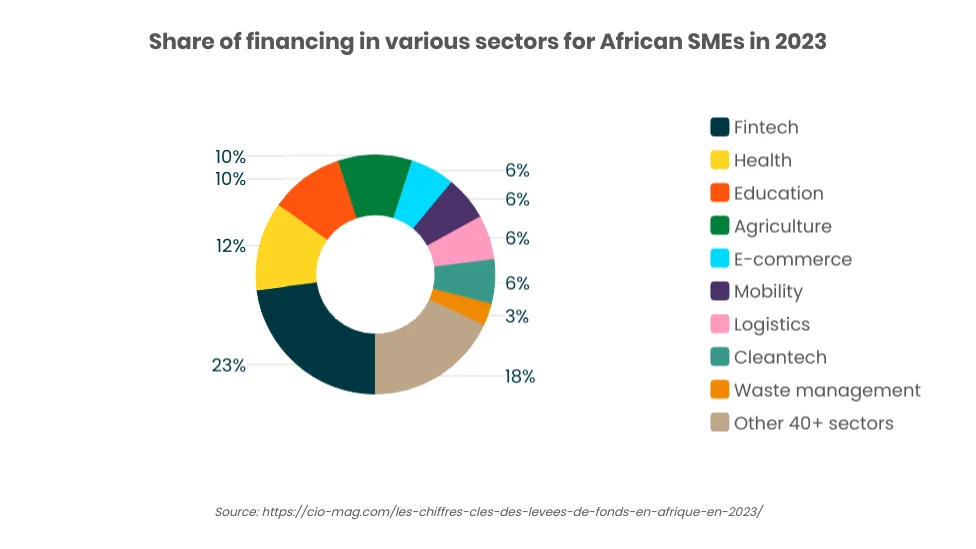Small and medium-sized enterprises (SMEs) are emerging as key drivers of economic growth in African countries. According to the African Development Bank, SMEs in Africa represent about 90 % of all businesses and contribute up to 33 % of the continent’s gross domestic product (GDP).
SMEs – Startups: A necessity for sustainable economic development
Africa’s SMEs are crucial for promoting sustainable development. They generate jobs, drive innovation, and boost GDP growth. As the continent rapidly develops, these enterprises act as the backbone of African economies, operating across various sectors including production, agriculture, processing, services, and technology. Their contributions are vital for GDP, employment, and poverty reduction.
SMEs are also key players in creating a resilient and inclusive economy. They develop mobile strategies for financial inclusion and adopt sustainable agricultural practices, furthering economic stability and growth.
The importance of SMEs in reducing unemployment in Africa
Small and medium-sized enterprises also account for around 40 % of total employment in Africa, making them a crucial source of jobs on the continent. African SMEs have experienced impressive growth in recent years, driven in particular by :
- A rapidly growing population
- Growing consumer demand
- An improving business environment
The rise of technology and digital innovation is crucial for SME growth in Africa, opening new opportunities for entrepreneurs. The « Technopreneur » culture is flourishing in countries like Nigeria, Kenya, and South Africa. Innovative startups such as Jumia Group, Andela, and Flutterwave are disrupting traditional industries and creating new markets. These startups attract significant investment, allowing them to expand rapidly and generate new jobs.
The case of South Africa : SME-friendly policy
South Africa is experiencing rapid growth in its SME sector, thanks to a well-developed private sector and sophisticated financial market that provide numerous opportunities. The country has implemented supportive policies like tax incentives and training programs. South Africa’s SME sector is diversified, encompassing businesses in healthcare, education, tourism, and more.
The case of Kenya : The breakthrough of technology startups
Kenya is witnessing a surge in SMEs, especially in the technology and agricultural sectors, buoyed by its expansive and expanding consumer market. The government is actively supporting SMEs through policies such as tax incentives and improved access to finance. The country boasts a vibrant ecosystem of technology startups and has attracted substantial investment. In 2023, Kenyan companies secured 800 million USD, accounting for nearly 28 % of the total funds raised across Africa.
Other African countries : Efforts to be encouraged
Ghana, Ethiopia, and Rwanda are among the African countries experiencing a surge in SMEs. These nations have enacted supportive policies and benefit from expanding consumer markets, offering ample opportunities for business growth. Notably, Nigerian startups received the highest investment in Africa in 2022, securing 1.2 billion USD, constituting 68 % of all SME funding in West Africa.
The growth of SMEs across Africa is promising, contributing to job creation and economic advancement. However, there’s a need for further support, including enhancing access to finance, offering training and mentorship programs, and implementing policies that streamline business entry processes.
Challenges facing SMEs in Africa
Small and medium-sized enterprises face many obstacles, including :
- Inadequate digital infrastructure
- Limited market access
- Limited access to financial information and technology
Many African SMEs need reliable electricity, Internet connectivity and other basic infrastructure. This makes it difficult for them to reach new customers, access markets and grow their business. In many cases, startups have to resort to costly alternatives such as generators, private transport and satellite communication systems, all of which increase operating costs. With the right digital infrastructure, these companies can remain competitive in the global economy.
Facilitating access to capital for startups
Access to capital remains a significant challenge for small companies in Africa, primarily due to requirements for collateral and credit history from traditional lenders. Many African SMEs operate within the informal sector, necessitating more collateral to access formal sector financing. Consequently, they often resort to informal lenders who impose high-interest rates. This cycle exacerbates the financial burden on SMEs and hampers their growth potential.
Facilitating access to regional and international markets
African small and medium-sized enterprises frequently require assistance in accessing regional and international markets, facing challenges such as trade barriers and inadequate information. Limited market access impedes their ability to compete with larger firms, constraining their growth prospects.
Moreover, regulatory hurdles, such as excessive bureaucracy, high taxes, and complex legal frameworks, pose significant obstacles for SMEs in Africa. These barriers hinder effective operations and stifle their potential for growth.
Solutions to reduce obstacles for SMEs
To address the challenges faced by businesses in Africa, governments must prioritize infrastructure development. This can be achieved through collaborative efforts involving government, the private sector, and development partners in public-private partnerships.
The private sector can contribute technical expertise, while the government provides the necessary regulatory framework and financing. Development partners can offer financial assistance to startups. An example of such collaboration is the small and medium-sized enterprise acceleration project initiated by Stride Enterprise Resource Planning (ERP) in partnership with various industrial entities.
Other solutions include governments partnering with financial institutions to devise policies and incentives that encourage lending to startups. Moreover, financial institutions can utilize technology to create innovative financial products accessible to these companies. These approaches can foster a conducive environment for SME growth and economic development in Africa.
Finally, governments and other organizations should develop training programs that help small and medium-sized businesses acquire new skills and technologies, such as :
- Business process management
- Digital marketing
- e-commerce
- Supply chain management
Priorities according to Capmad
As the continent undergoes transition, prioritizing support and empowerment for businesses is crucial. Through collaborative efforts involving government initiatives, stakeholders, and policymakers, an enabling environment can be created for SMEs to thrive. This unlocks their full potential, contributing to a more sustainable future for Africa.
Furthermore, investing in startups enables Africa to leverage entrepreneurship in addressing challenges, fostering resilience, and promoting inclusive economic growth. By nurturing innovation and supporting the growth of small businesses, Africa can harness the transformative power of entrepreneurship for the benefit of its people and communities.








